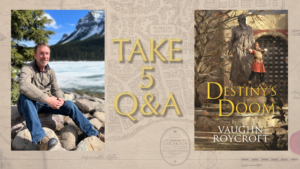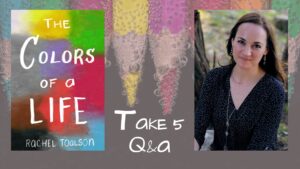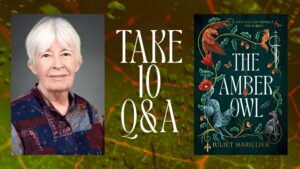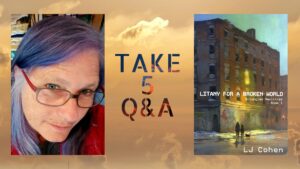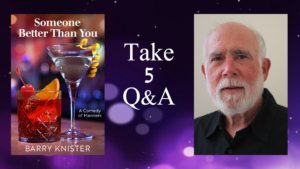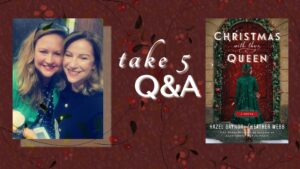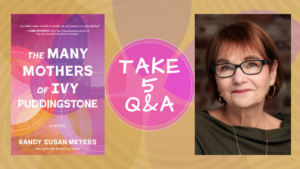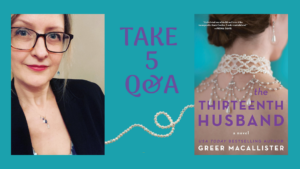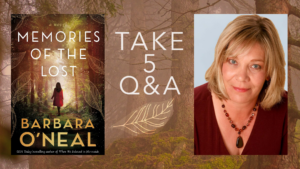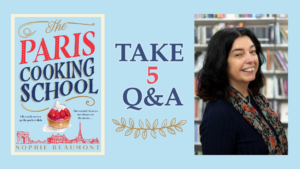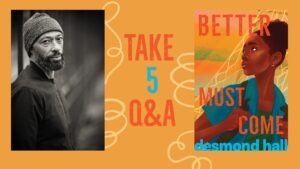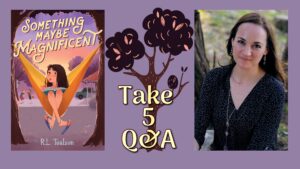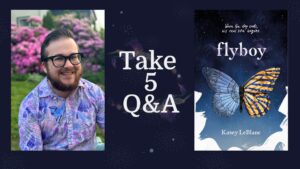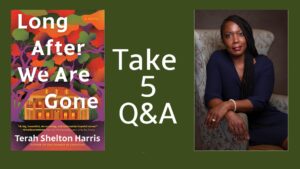Take Five
Vaughn Roycroft, longtime WU contributor, dear friend, and assistant editor, releases his third novel—DESTINY’S DOOM, the final book in his epic Sundered Nation Trilogy–a week from this Tuesday, on March 18th.
When thinking about how to introduce this interview, we kept coming back to the same truth: Who doesn’t love Vaughn? He’s the nicest among us, the one most likely to leave a thoughtful comment on any given day, always ready with a kind word. Of course, we want to support him—because who wouldn’t?
But pointing out Vaughn’s generous heart and dedication to this community felt too easy—too obvious. We wanted something more.
So, we went digging in the WU archives to find his very first comment here. And, friends, we hit the jackpot.
September 17, 2010, at 9:01 AM
“…I’m a first-time novelist, and in the past year I put my first manuscript out there for others to read. I’ve been on the receiving end of that awkward moment you describe more often than I care to remember, including my own mother’s initial response. In the first round, the highly mixed reviews nearly caused me to quit. I reminded myself that many of these readers have never even read my chosen genre. I rededicated myself, revised, and I know I came up with a better result. I have the rewritten version out there again, and the results are much improved. It’s still my story, but seeing it through the eyes of others helped me to bring clarity to it. The process has been a roller coaster ride of joy and pain, but in the end, so very worthwhile.”
That date—2010—reminds us that storytelling is a journey, and not just for our characters.
Over the years, Vaughn has faced doubt and struggle, but also moments of triumph—seeing his books reach fantasy readers, growing a loyal fan base, and even hearing his work brought to life as an audiobook (which, by the way, is excellent).
One of the biggest keys to finishing a novel is perseverance, and few embody that spirit like Vaughn. He has always had a vision, and no matter what life threw at him, he never stopped pushing forward.
And now, with his first trilogy complete, we get to celebrate this enormous milestone with him.
Let’s dive in.
Q1: What’s the premise of your new book?
VR: Destiny’s Doom is the final edition of The Sundered Nation Trilogy. Although I doubt there will be many who will be overly concerned, I suppose I ought to start by warning that it will be nearly impossible to answer many questions about book 3 without revealing mild spoilers for books 1 and 2.
To quickly bring you up to speed, here is how I began my answer to this question for book 2, Bold Ascension:
“The Sundered Nation Trilogy is rooted in the culture clash between the Germanic Tribes and the Roman Empire during its decline. Book 1, The Severing Son, is about the rise of a young, banished chieftain—Vahldan of the Amalus—to prominence. With the help of his warrior woman guardian, Elan, Vahldan seeks to lift his people from poverty. Finding he is up against those who would repress their own people for profit, he seeks to bypass the system by pursuing glory to the fringes of a nearby […]
Read MoreWe are so delighted to put the focus on WU contributor and award-winning author Rachel Toalson’s most recent book. THE COLORS OF A LIFE is a collection of poetry and is out now! What’s the pitch?
“The Colors of a Life reminds us that all the pretty and not-so-pretty colors we experience over a lifetime shape us into who we are. And they all (even the not-so-pretty ones) add up to a brilliant life.
Perfect for fans of Mary Oliver, Sharon Olds, Billy Collins, and Maggie Smith, The Colors of a Life is Rachel’s tenth book of poetry.”
Did you catch that, WU? Her tenth! Wow. Congratulations, Rachel–you are an inspiration! Are you all as ready as we are to learn more? Here’s Rachel:
Q1: What’s the premise of your new book?
RT: The Colors of a Life is a poetry collection that observes and honors all the colors of a life. Through poetry, I explore the colors of love, loss, childhood, joy, hope, mental illness and much more, braiding the past with the present and the future. Some of the poems are humorous, some somber, some celebratory, some incredibly introspective. I span such subjects as the wonder (and comfort) of gray sweat pants, the bliss of crispy tater tots, the yellow and purple beginnings of eating disorders and body dysmorphia, the orange and red hues of connection, the brown reminders of the infinite, and all the worlds in between.
I suppose, at its heart, The Colors of a Life is a collection that celebrates life itself.
Q2: What would you like people to know about the story itself?
RT: The collection began with my hypothesis that while we don’t consider every color beautiful, they can still be beautiful. Even the colors we tend to wrinkle our noses at (brown? Who says their favorite color is brown except for my husband, because it’s the color of my eyes?) can still be beautiful when we examine them through love and understanding. So maybe there is a not-so-great memory associated with brown (hello, collecting pecans to get out of the house where a dad yelled), but how can we reframe that and look at it through a lens of understanding? How did it shape who we became, even if it was terribly uncomfortable? How can we redeem brown? Well, some of my kids’ eyes are brown. Of course that’s beautiful.
All these colors–whether we consider them beautiful or not–shape us into who we are. So maybe they’re worth paying a little closer attention to in our memories and in our present lives.
Q3: What do your characters have to overcome in this story? What challenge do you set before them?
RT: I don’t have characters, since this is a poetry book, but I think what I had to overcome and what I hope readers will overcome is a general sense of ennui and/or malaise in my life. The world can take so much out of us. But reconnecting to the beauty of moments can sometimes lift our spirits and help us feel less weary and bored and dissatisfied with where we are and where we’re going.
Q4: What unique challenges did this book pose for you, if any?
RT: Any time I’m collecting my poetry into a book, I usually have two challenges: (1) sorting through the thousands of […]
Read MoreWe’re delighted to bring you a sneak peek at the upcoming release from longtime WU contributor Heather Webb and her collaborator Hazel Gaynor. The book, CHRISTMAS WITH THE QUEEN, releases this coming Tuesday, November 19th. A bit about their collaboration:
Hazel Gaynor and Heather Webb’s co-written historical novels have all been published to critical acclaim. The USA Today and international bestseller, Last Christmas in Paris, won the 2018 Women’s Fiction Writers Association Star Award, Meet Me in Monaco was shortlisted for the 2020 Romantic Novelists’ Association Historical Novel award, and Three Words for Goodbye was selected by Prima Magazine as a Best Novel of 2021. Christmas With The Queen is their fourth collaboration.
The book is getting plenty of pre-release buzz, including this:
“A page-turning festive read, full of will they/won’t they romance, intriguing glimpses of royal life behind palace doors, and inspiring culinary treats. As delicious as a Christmas pudding topped with flaming brandy and lashings of cream.”- Gill Paul, USA Today bestselling author
In the spirit to hear more? Here are Heather and Hazel!
Q1: What’s the premise of your new book?
HW&HG: Pitched as The Crown meets When Harry Met Sally, Christmas with the Queen is a heartwarming historical novel, set during the early reign of Queen Elizabeth. A royal chef and a royal correspondent to the BBC who share a past, meet again unexpectedly in the halls of Sandringham and Buckingham Palace. Despite personal and professional heartache, Jack and Olive’s paths continue to cross over the following five Christmas seasons and they find themselves growing ever closer. Yet Olive carries the burden of a heavy secret… You also see the queen and Prince Philip moving through the background of the story. It’s very Christmasy, very cozy, and more than a little nostalgic in the best way.
Q2: What would you like people to know about the story itself?
HW&HG: What early readers have most loved about the book are the combined elements of the 1950s setting, the scenes written from the point of view of Queen Elizabeth, the ‘behind-the-scenes- look at life at Sandringham at Christmas, and the will they/won’t they romance between Olive and Jack. The story takes us from London’s Piccadilly to as far away as New Zealand and Antarctica! Lots of readers have also picked up on the culinary elements – how could we not lavish the story with lots of mouth-watering dishes when Jack, a chef from New Orleans, has joined the staff.
Q3: What do your characters have to overcome in this story? What challenge do you set before them?
HW&HG: As with all the best love stories, Jack and Olive’s relationship is complicated and messy. They experience a whole range of emotions during the five years when the main story of the book is set as well as a limited secondary timeline where you see our two main characters meet, the day the end of WWII is announced in the UK (Victory in Europe Day).
For Olive, an ambitious young woman at the BBC, she faces challenges of being taken seriously as a reporter and to be given the same opportunities as her male counterparts. Also a single mother, she faces […]
Read MoreWe are thrilled to bring you an interview with longtime WU contributor, Sophie Masson, for a sneak peek at her new adult novel, The Paris Cooking School (written under the name of Sophie Beaumont), which comes out in the US and Canada on August 6, published by Alcove Press. The novel first came out in Sophie’s native Australia in November 2023, and received great reviews (including a full page in Australian hottest women’s magazine). The book was subsequently sold to North America, Portugal (where it’s just come out), Germany, and Ukraine.
There are two additional bits of exciting news in advance of the publication here in the states and in Canada. First, North American audio rights have just been sold. Also, Barnes and Noble is including it in their fabulous Sale for the Pages pre-order promotion, which is already in progress, running from July 10 to July 17. It’s all looking very promising in the lead up to publication!
Want to know more? Read on:
Q1: What’s the premise of your new book?
SM: My book, The Paris Cooking School (written under the pen-name of Sophie Beaumont) is an adult contemporary novel set, you guessed it, in Paris 😊 It features three main characters, Kate Evans, Gabi Picabea and Sylvie Morel, who are all at crossroads in their lives. Gabi and Kate have both come for the month-long course at Sylvie’s Paris Cooking School, after major crises in their lives—in Kate’s case, a bitter marriage breakup, in Gabi’s case a crippling creative block. Meanwhile, Sylvie is facing a worrying online harassment campaign targeting her business, and trouble from her commitment-shy lover Claude. What the three women find during that extraordinary April in Paris will change the course of their lives—and bring new love, too. Set against a gorgeous background of Paris in spring, and studded with delicious references to French food, it’s a novel that Australian readers have already taken to their hearts, and which I hope North American readers will just as much! The book comes out in the US and Canada on August 6, published by lovely Alcove Press.
Q2: What would you like people to know about the story itself?
SM: This is a story that gave me immense pleasure to write—it combines so many things about my heritage, my experience, my interests—and I am delighted that it’s already given other people so much pleasure to read. It’s a joyful, hopeful novel, even though it doesn’t shy away from the real difficulties and challenges that life throws up. It’s a novel of second chances, of finding yourself in a magical city. It’s a novel to savour and relish on a long summer’s day—or any day, come to that!
Q3: What do your characters have to overcome in this story? What challenge do you set before them?
SM: They have to overcome many things, amongst them betrayal by those nearest to them, online trolling, misunderstandings, crises of confidence…but in the end, they overcome them, not always in the ways you might expect!
Q4: What unique challenges did this book pose for you, if any?
SM: I have to say this book was such a joy to write that I can’t really think of any particular challenges I faced: for me it combined perfectly my […]
Read More
We’re delighted to bring you an interview with author and WU contributor Desmond Hall, and a sneak peek at his upcoming release, BETTER MUST COME. What’s the pitch?
Barely Missing Everything meets American Street in this fiercely evocative, action-packed young adult thriller that looks at the darker side of light-filled Jamaica and how a tragedy and missing drug money helplessly entangle the lives of two teens who want to change their fate.
The book is gaining a lot of buzz, including: “Hall presents an expansive exploration of how class and privilege intersect within Jamaican culture through the eyes of teens in this intimately narrated tale told via Deja and Gabriel’s dual POVs.“–Publishers Weekly; and this: “Criminal intrigue and the unique vulnerabilities of Caribbean youth make for high-stakes hijinks with a lot of heart.”–Kirkus Reviews
Want to hear more? Read on!
Q1: What’s the premise of your new book?
Desmond Hall: BETTER MUST COME is an evocative, action-packed YA thriller that looks at the darker side of light-filled Jamaica and how tragedy and missing drug money helplessly entangle the lives of two teens who want to change their fate.
Deja is a “Barrel Girl” – one of the Jamaican kids who gets barrels (containers filled with clothes, food and other goods not available on island) from parents who’ve left them to go to the US and Canada to make more money. Gabriel is caught up in a gang and desperate for a way out. When he meets Deja at a party, he starts looking for a way into her life, and starts wondering if they could be part of each other’s futures.
Then one day, while out fishing, Deja spies a go-fast boat stalled out by some rocks and smeared with blood. On board, a badly wounded man thrusts a bag at her, begging her to deliver it to someone halfway across the island, and not to say a word. She binds his wounds, determined to send help and make good on her promise…not realizing the bag is stuffed with half a million US dollars. Not realizing that the posse Gabriel is in will stop at nothing to get the bag. Or that Gabriel’s and her lives will intersect in a way they never could have imagined as they’re forced to make split-second decisions to save the lives of the ones they love.
Q2: What would you like people to know about the story itself?
DH: A really cool thing about Better Must Come is that it’s a lose retelling of Homer’s Odyssey. Like Odysseus, the Greek warrior, who had to use his wits and courage to find his way home after the Trojan wars, Deja must also use best attributes. They are both warriors of different kinds navigating different times.
Also, the theme of abandonment plays a much larger role in Better Must Come. In the Odyssey, Odysseus abandons his family to go fight in the wars, whereas Deja is abandoned by her mother who leaves to earn money in the “first world”, and then Deja in turn abandons her siblings to go on an odyssey in order to save her family.
What’s also fun, is that readers can find “Easter eggs” throughout the book, as there are characters from the Odyssey that are reimagined […]
Read More
We are delighted to bring you a first look at the new book of award-winning middle-grade author and WU contributor Rachel Toalson. SOMETHING MAYBE MAGNIFICENT is a sequel to last summer’s release, and as it was then, this book is receiving great pre-release buzz, such as:
“This sequel thoughtfully and sincerely explores themes of womanhood, family, anxiety, and identity…Tugs at the heartstrings and shows the importance of unconditional love.”–Kirkus Reviews
Ready to take a deeper dive? Here’s Rachel!
Q1: What’s the premise of your new book?
Rachel Toalson: There’s a new man in her mom’s life and 13-year-old Victoria Reeves is determined to get rid of him, whatever it takes.
This summer she’s reading Sylvia Plath and trying to get published, she’s growing up and getting used to her monthly “visitor,” and she’s coming to terms with her relationship with her estranged father while she grapples with her evolving views of womanhood. But the biggest bump in her “magnificent summer plans” is her mom’s new boyfriend, Kyle Moreland.
To protect her mom and family from this unwelcome interloper, Victoria plays pranks on Kyle, blames him for messes and spills, and tries to make his life as miserable as she possibly can so he’ll go away. Meanwhile, she wrestles with the knowledge that this mean person doing these mean things isn’t really who she is. And she’s not sure it’s who she wants to be. But you have to do what you have to do to protect your family, right?
When things go a little too far, Victoria has to decide whether she’ll continue building her walls of self-protection or if she’ll let someone new–someone who might be a really good guy–step into the gap her father left and help her and her family move on.
Something Maybe Magnificent is a sequel to last summer’s release, The First Magnificent Summer, but it also stands alone and can be read without reading the first.
Q2: What would you like people to know about the story itself?
RT: This story is a very personal story for me, as was The First Magnificent Summer. When my stepfather came into my life, I reacted exactly the way Victoria reacts. I did most of the things she does. In fact, this story is basically our story.
Kids of divorce aren’t always welcoming to the people who come into their parents’ lives after a divorce. There’s a very quiet, persistent hope that says, Maybe Mom and Dad will get back together and things will be better than before, despite all the evidence to the contrary. I’m a child if divorce. I know this hope can oftentimes blind us to the love and wonder of potential stepparents.
This book is a realistic picture of that struggle, but it’s also a celebration of good stepparents. The ones who stick around and say, I’m gonna love you the best way I know how, because you’re magnificent and you deserve it. That’s what my stepfather did for me and my brother and sister. Good stepparents step into the gap left by a parent, and they love kids the way they should be loved, which is to say unconditionally, without expectation, without end.
Q3: What do your characters have to overcome in this story? What challenge do you set before them?
RT: Victoria […]
Read MoreWe are thrilled to bring you a closer look at the new novel from author and WU contributor Terah Shelton Harris titled, Long After We Are Gone, out this coming Tuesday (May 14). After the triumph of Terah’s debut last year, we can’t wait to see what she has in store for us. Especially after hearing praise like that of NY Times Bestselling Author Quinn Connor: “Once again, Terah Harris proves she is a powerhouse of Southern literature whose unmistakably poignant prose, profound themes and vibrant characters are built to stand the test of time. Long After We Are Gone is a beautifully-woven story of familial bonds, generational trauma and the nature of love. Richly evocative, this book will move your soul.”
Want to hear more? Here’s our interview with Terah:
Q1: What’s the premise of your new book?
TSH: LONG AFTER WE ARE GONE is a powerful and emotional family drama of four siblings grappling with their personal demons and collective struggles who return home after their father dies to save their ancestral home, the Kingdom, and 200 acres of land from being sold to a development company. This book is inspired by the story of Melvin Davis and Licurtis Reels of North Carolina who went to jail for eight years after refusing to leave the land their great grandfather purchased more than a century ago after it was sold from underneath them without their knowledge or consent. I first read their story years ago and was frustrated, shocked, and angry not only at what happened to them, but that I had never heard of ever heir property before. After much research, I was amazed that the brothers were not alone in their fight and that involuntary land loss from heir property is such an important issue that no one really knows about or talks about.
Q2: What would you like people to know about the story itself?
TSH: LONG AFTER WE ARE GONE is a work of fiction but the circumstances surrounding heir property is not. After the Reconstruction, Black Americans started buying land and at the same time laws were created to dispossess them of their land. Because they could not trust Southern white courts, in the case of the Solomon siblings and so many Black families now and then, the Kingdom was passed down without a will, making it heir property, a form of ownership in which descendants inherit an interest in the land, similar to holding stock in a company. One of the problems with heir property is that over time, there can be quite the number of heirs to the land. Heir property does not constitute a clear title which means the land is vulnerable to developers, corporations, and governments. Not having a clear title can lead to many challenges. Because it is difficult for heirs to prove ownership, they may be unable to access loans and mortgages, apply for USDA grants or loans. It’s estimated that tens of thousands of Katrina victims with heir property could not prove ownership. Heir property is not recognized as “the worst problem you never heard of” or the “the leading cause of Black involuntary land loss” by the U.S. Department of Agriculture without justification. In LONG AFTER WE ARE GONE, […]
Read More
